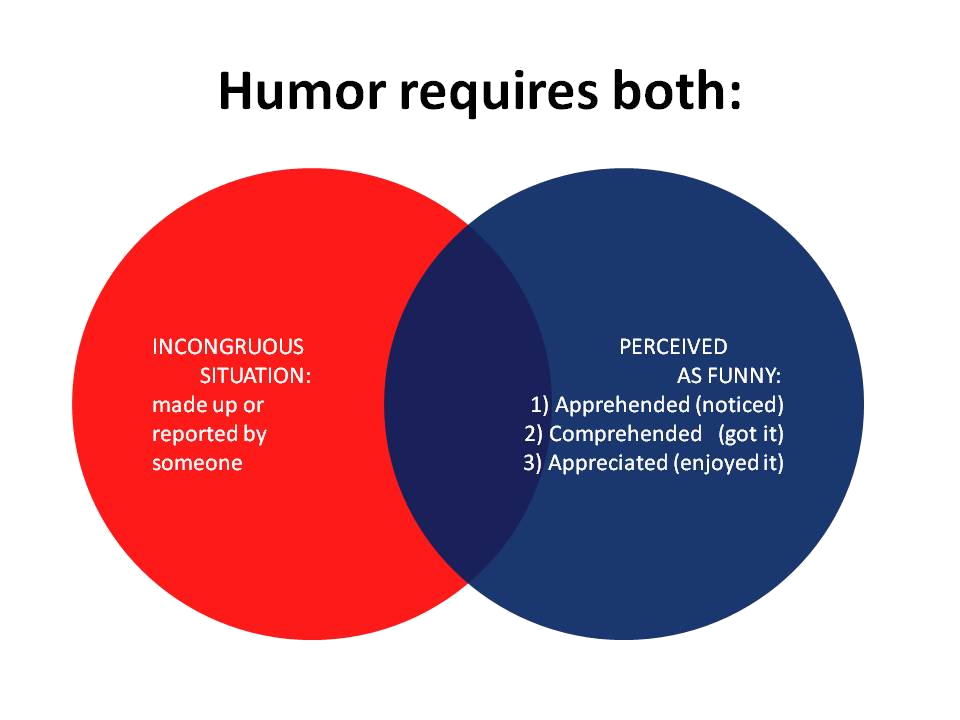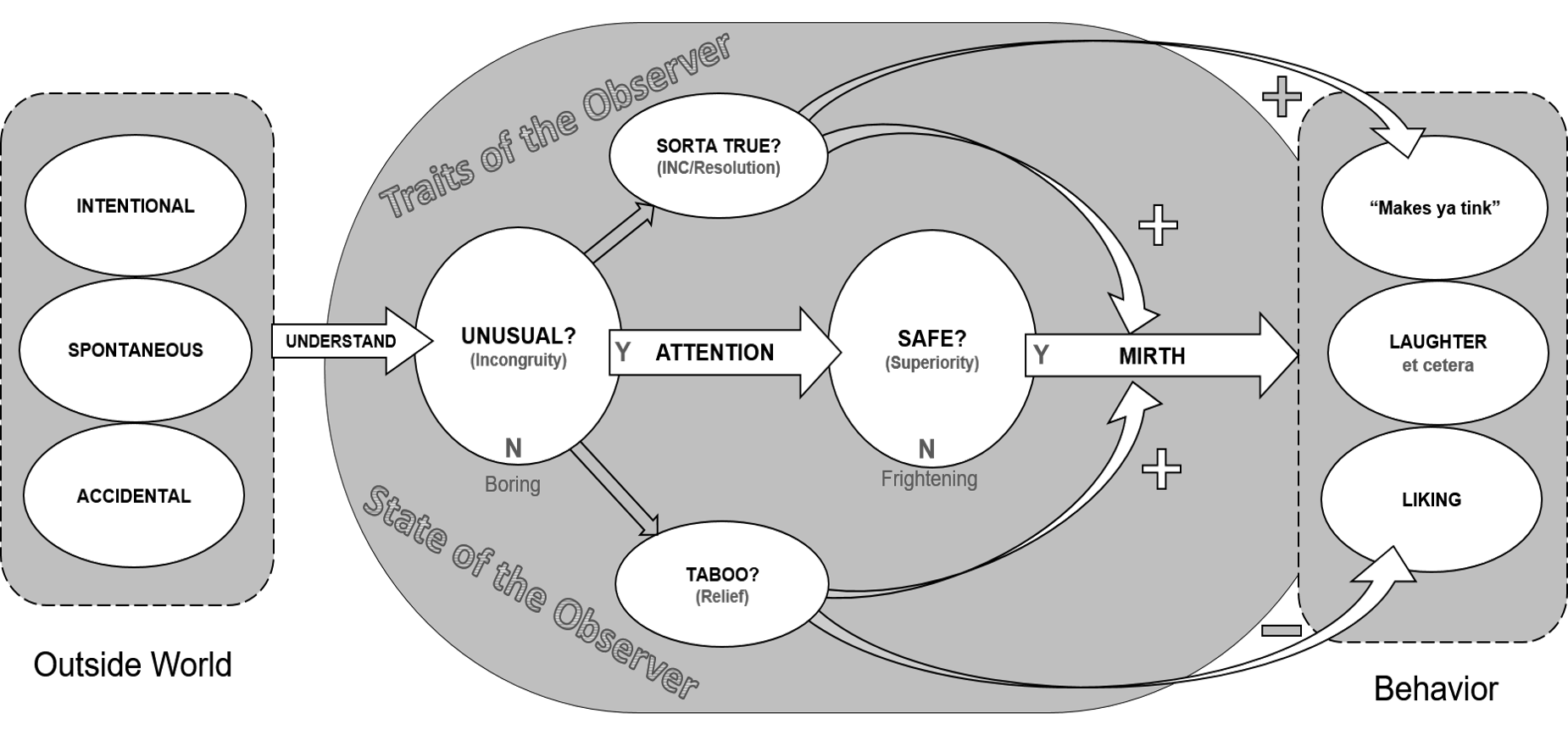Research
Overview
What is humor, exactly? The question seems pointless - because we can all think of examples of humor, and we all know it when we see it. However, when we try to define exactly what does and does not count as humor, we find it difficult. For example, what do you think about the following questions?
If you tell a good joke properly and no one likes it, is it still humor? When a group of children ridicules another kid's new glasses, is that humor? If an emotionally disturbed person suddenly laughs for no apparent reason, is that humor? If you get a joke that was made at the expense of some racial minority, are you a racist? If you laugh because the dentist gave you nitrous oxide, or because you're nervous, or because someone tickled you or stimulated some section of your brain ... is that humor? The answers to these questions are not obvious.
We could begin by looking at what has already been written about the nature of humor. Or we could look at the theories that have already been offered to explain it. Many have tried to answer the most important questions: When will we find things funny (response theories)? What makes things funny (stimulus theories)? What speculation has been offered about the purpose of laughter (functional theories)?
These questions have fascinated our most respected thinkers (and quite a few others) for millennia, but their sporadic writings on humor have produced more questions than answers. Even today, there are no agreed definitions of humor or accepted theoretical models of its constructs and their interrelations. Some have written about laughter, while others have written about humor or jokes or comedy styles, others about the social impact of the content of humor, and still others about the neural mechanisms of humor - without identifying (or even seeming to notice) the vast differences among these diverse topics. The current status of the field of Humor Research would have to be characterized as preliminary, at best.
Myths
It is commonly assumed that laughter releases endorphins, because that claim appeared in early humor texts. However, only two scientific studies have ever been reported on this topic and, in each case, they failed to show any increase in the flow of (beta-)endorphins. The idea is probably due to the fashionable expression "feel the endorphins" that was used to express all positive feelings in the 1970s. Some still insist that there are endorphins, and that we just haven't found the correct way to measure them. Ultimately, it may be unimportant whether the relative euphoria of laughing is related to endorphin flow or some other mechanism. But, as scientists, can we afford to cling to favored beliefs in spite of the evidence before us?
Anyone who claims that humor healed Norman Cousins of cancer is, to put it politely, mistaken. Cousins recovered from a rare collagen disorder that had a 0.2% recovery rate (1 in 500 recover). He was certainly fortunate to be one of those who recover, but it was no miracle. Cousins took every medication his doctors prescribed for him, including five whole grams of Vitamin C per day. He emphatically did not reject medical treatment in favor of laughter; he simply checked out of the gloomy hospital to have a more pleasant convalescence. He found that ten minutes of belly-laughter gave him two hours of pain-free sleep. While humor helped him avoid the fear and panic that usually accompany illness, and while this was a great help in his recovery, he never claimed that laughter had healed him and we should be extremely cautious about claims that humor or laughter can cure anything.
The enthusiasm of some writers in this area is astounding. Some authors will claim that their theory is so important and clever that other theories are therefore obsolete and should be abandoned! They need to remember ANEKANTAVADA: The story of the blind monks and the elephant. Besides being tiresome, their bravado is simply unjustified. Like the pioneers in any interdisciplinary field, we have to adopt a more thoughtful approach. The different perspectives of various researchers have to be acknowledged, compared and contrasted. Then they have to be weighed for their impact on the most helpful and relevant questions. Is it more important to speculate about when and why laughter arose in humans than to investigate how to use humor effectively and responsibly in our own lives?
My own research into humor takes two directions: a philosophical inquiry into its nature (discussed here) and a practical assessment of its effective and responsible use in persuasion.
Philosophy
Humor is a phenomenon that involves at least the following:
a) something unusual/incongruous, and
b) our perception of it as "funny"

1) Not every unusual thing or situation will be found funny.
It needs to be unusual enough to get our attention
but not so unusual as to confuse or frighten us
2) It is generally unusual in a specific way:
Two seemingly disparate things or perspectives
are tied together in a surprising way
As illustrated here, many different people are looking at humor from many different angles. Like the blind folks in the old tale about the elephant, they are investigating different aspects of the phenomenon, they often believe they have discovered The Truth, and they want to compete amongst themselves to decide which of them is Correct.

To further complicate the matter, many of them are not even looking at the elephant itself. They are looking at related phenomena like laughter, social context, or fun in general. They are just as blind as the others, just as argumentative and, of course, just as wrong.
I am trying to sort through what is actually known. I want to begin with a long list of statements that seem clearly wrong, most of which begin with "Humor is nothing other than ... " Perhaps we can set these aside. It may also be possible to set aside, at least for the moment, investigations of epi-phenomena like laughter and fun. If we can then transcend the terminology in various fields, it may be possible to identify aspects of humor on which we agree. Presumably, we are on the right track in those cases. Thus, it might be possible to isolate those areas of controversy and debate that merit further discussion, comparison, testing, and re-framing.
If you're interested in learning more about humor as a phenomenon, I think these two books are essential: The first is Humor: Its Origin and Development (San Francisco: W. H. Freeman, 1979) by Paul McGhee. You should be able to find this online or at a library under BF-723 (Library of Congress) or 152.4 (Dewey Decimal System). Although McGhee bristles at any suggestion of forming philosophical abstractions, and although the book is not very new, I think his writings are essential to understanding what we know about the nature of humor. Writing from a college, he opened the field to disciplined scholarly inquiry before moving on to the more lucrative field of business consulting.
The second is The Philosophy of Laughter and Humor (Albany: State University of New York Press, 1987) edited by John Morreall. You should be able to find this online or at a large library under PN-6149 (Library of Congress) or 128.3 (Dewey Decimal System). Morreall produced what is arguably the world's best literature review on the philosophy of humor as part of his dissertation, before moving on to the more lucrative field of business consulting.
After investigating these sources, you will be ready to focus on your own particular area of interest using the book Laughingly Referred To - an list of scholarly works on humor gathered and published by sociologist Jason Rutter (Manchester). The Association for Applied and Therapeutic Humor (AATH) includes some thoughtful writing, such as that of Steve Sultanoff. Finally, you can visit the website of the International Society for Humor Studies (ISHS). There you will find a list of more than a hundred active humor scholars and information on the quarterly journal Humor: International Journal of Humor Research - published by de Gruyter since 1988. If you become interested in joining the ISHS, you can contact Martin Lampert ([email protected]) for an application.
Some people will tell you that humor research is frivolous. I think they are wrong. Humor is important to vent stress, build relationships, and see new perspectives. Avoiding offense, distraction, and loss of credibility are important to our success. Others will tell you that humor research gets no respect. I think they are right. New scholars have found that they cannot rely on humor research to build their reputations and earn tenure.
In my own field (organizational behavior), there are some tremendous researchers like Allan Filipowicz at Cornell, Cecily Cooper at the University of Miami and Prasad Balkundi at SUNY Buffalo. They have a keen interest in humor and have produced careful scholarship on the subject. However, they have had to make their mark in more established areas of research such as group processes, trust, and social networks. It seems likely that new scholars will have to keep their interest in humor somewhat on the 'back burner' until they have earned the luxury of tenure.
Now you are ready to explore the topic further. If interested, you can read my 2001 doctoral dissertation on the topic HERE.

Publications
20. Lyttle, Jim. 2020. Political humor in a changing landscape: A new generation of research. [Book Review] Studies in American Humor, 6(2), 379-382. LINK
19. Lyttle, Jim. 2018. A philosophy of comedy on stage and screen: You have to be there. [Book Review] Studies in American Humor, 4(2), 296-299. LINK
18. Lyttle, Jim. 2015. Catching the joke: Evaluating the use of humour in therapy. New Therapist. 97, 8-21. LINK
17. Lyttle, Jim. 2014. Workplace control. In Encyclopedia of Humor Studies, edited by Salvatore Attardo. Thousand Oaks, CA: Sage. ISBN: 9781412999090
16. Lyttle, Jim. 2010. Getting serious about humor research. [Letter to the Editor] Journal of Psychosocial Nursing and Mental Health Services, 48(11), 6. LINK
15. Lampert, Martin D., Kate L. Isaacson, and Jim Lyttle. 2010. Cross-cultural variation in gelotophobia within the United States. Psychological Test and Assessment Modeling 52, no. 2:202-216. LINK
14. Lyttle, Jim. 2010. A realistic look at why work is not more fun. International Journal of Arts and Sciences, 3(13), 532-541. LINK
13. Proyer, René T., Willibald Ruch, Numan S. Ali, Hmoud S. Al-Olimat, Toshihiko Amemiya, Tamirie Andualem Adal, Sadia Aziz Ansari, Špela Arhar, Gigi Asem, Nicolas Baudin, Souha Bawab, Doris Bergen, Ingrid Brdar, Rute Brites, Marina Brunner-Sciarra, Amy Carrell, Hugo Carretero Dios, Mehmet Celik, Grazia Ceschi, Kay Chang, Chen Guo-Hai, Alexander Cheryomukhin, Maria P. Y. Chik, Wladyslaw Chlopicki, Jacquelyn Cranney, Donatien Dahourou, Sibe Doosje, Margherita Dore, Nahwat El-Arousy, Emilia Fickova, Martin Führ, Joanne Gallivan, Han Geling, Lydia Germikova, Marija Giedraityte, Abe Goh, Rebeca Díaz González, Sai Kin Ho, Martina Hrebícková, Belen Jaime, Birgit Hertzberg Kaare, Shanmukh Kamble, Shahe Kazarian, Paavo Kerkkänen, Mirka Klementová, Irina M. Kobozeva, Snjezana Kovjanic, Narasappa Kumaraswamy, Martin Lampert, Chao-Chih Liao, Manon Levesque, Eleni Loizou, Rolando Díaz Loving, Jim Lyttle, Vera C. Machline, Sean McGoldrick, Margaret Mcrorie, Liu Min, René Mõttus, Margret M. Munyae, Carmen Elvira Navia, Mathero Nkhalamba, Pier Paolo Pedrini, Mirsolava Petkova, Tracey Platt, Diana-Elena Popa, Anna Radomska, Tabassum Rashid, David Rawlings, Victor J. Rubio, Andrea C. Samson, Orly Sarid, Soraya Shams, Sek Sisokohm, Jakob Smári, Ian Sneddon, Irena Snikhovska, Ekaterina A. Stephanenko, Ieva Stokenberga, Hugo Stuer, Yohana Sherly Rosalina Tanoto, Luis Tapia, Julia Taylor, Pascal Thibault, Ava Thompson, Hanna Thörn, Hiroshi Toyota, Judit Ujlaky, Vitanya Vanno, Jun Wang, Betsie Van Der Westhuizen, Deepani Wijayathilake, Peter S. O. Wong, Edgar B. Wycoff, and Eun Ja Yeun. 2009. Breaking the ground in cross-cultural research on Gelotophobia: A multi-national study involving 73 countries. Humor: International Journal of Humor Research, 22(1-2), 253-279. LINK
12. Lyttle, Jim. 2009. Humor in advertising: A comprehensive review [Book Review]. Humor: International Journal of Humor Research, 22(4), 469-472. LINK
11. Lyttle, Jim. 2008. Evaluating management educators: Does being funny really matter? LINK
10. Lyttle, Jim. 2007. Using humor in e-advertising: Avoiding the dual minefields of offense and confusion. The E-Business Review, 7, 141-144. LINK
9. Lyttle, Jim. 2007. The judicious use and management of humor in the workplace. Business Horizons 50, no. 3:239-245. LINK
8. Spierer, David K., Sandra H. Williams, and Jim Lyttle. 2007. Inactive brains: An interrupted case study. National Center for Case Study Teaching in Science. University at Buffalo, State University of New York. LINK
7. Lyttle, Jim. 2005. The effective use of humor in e-advertising. The E-Business Review, 5, 123-126. LINK
6. Lyttle, Jim. 2002. The ethics of humour: Preliminary thoughts. LINK
5. Lyttle, Jim. 2001. The effectiveness of humor in persuasion: The case of business ethics training. Journal of General Psychology, 128(2), 106-116. LINK
4. Lyttle, Jim. 1998. Dirty business: Exploring corporate misconduct: Analysis and cases [Book Review] Business & Society, 37(3), 339-341. LINK
3. Lyttle, Jim. 1998. The ABCs of humour. In Pursuit 2(4): 9.
2. Lyttle, James B., Rosemary Grant, and Linda Klebe Treviño. 1998. BETS-L listserver discussion/debate on the continued relevance of Kohlberg. In L. Pincus Hartman, Perspectives in business ethics (pp. 110-115). Homewood, IL: Irwin/McGraw-Hill.
1. Lyttle, James B. 1998. Shortest ethics case ever. In L. Pincus Hartman, Perspectives in business ethics (p. 665). Homewood, IL: Irwin/McGraw-Hill.

